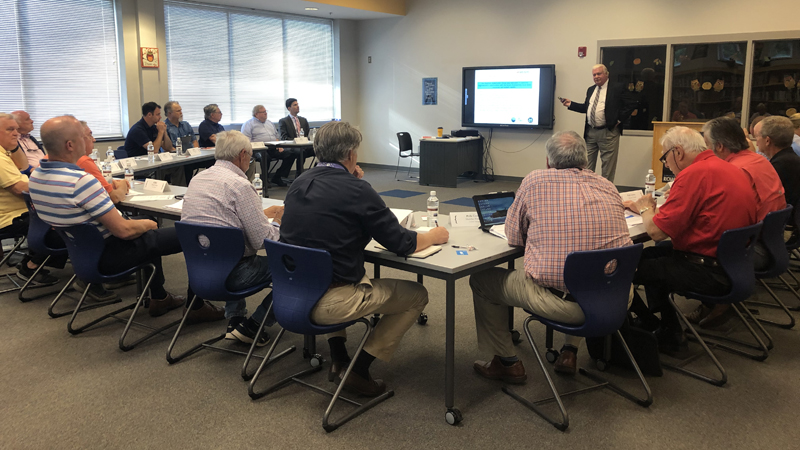Is regional water on the horizon?
Published 11:31 pm Sunday, September 29, 2019

- Arcadis Design and Consulting Engineer Vice President John Kersten was part of a work session held Tuesday with the Polk County Board of Commissioners, Broad River Water Authority and Inman-Campobello Water District to discuss the future of water services. (Photos by Leah Justice/Tryon Daily Bulletin)
Polk meets with BRWA, ICWD, Arcadis for water talk
MILL SPRING—It could be 5, 10 or even 50 years from now, but water providers will likely join together sometime in the future.
The Polk County Board of Commissioners met with the Broad River Water Authority, Inman-Campobello Water District and Arcadis Design and Consulting on Tuesday at the Polk County Middle School.
The purpose of the work session was for the three entities to discuss the future of its water partnership. Arcadis conducted a regional water study recently and reviewed options from the study.
Polk County, BRWA and ICWD after discussions decided to allow its managers to continue working on options. One of the first tasks will be to research the law, since Polk County and BRWA are located in North Carolina and ICWD is located in South Carolina.
During the work session, each entity reviewed its history.
BRWA
The BRWA was formed in 1999 by the towns of Rutherfordton, Spindale and Ruth along with Rutherford County. BRWA purchased Duke Power system with revenue bonds of $30.4 million and assumed operations in December 2000.
BRWA experienced significant decline in sales with the loss of textile and furniture industries in the first 5 years of operation. BRWA has 250 miles of water lines in Rutherford County, a 12 million gallon per day water treatment plant on the Broad River and averages 5.65 million gallons per day of water production.
There are 6,700 active accounts with $6.7 million in annual sales and $8 million capital reserve fund. BRWA has $16.3 million in long-term debt, which will retire in 2026. The average monthly bill for customers for 5,000 gallons is$48.34.
ICWD
ICWD formed as a special purpose district in 1954 with an initial $1 million bond to fund 17.5 miles of waterline and connect to Spartanburg Water. ICWD assumed ownership and operations for water systems from Inman and Campobello and ceased taxation in 1981.
ICWD has 500 miles of waterlines in Spartanburg County and is a wholesale purchaser of finished water from BRWA through Polk County with an average purchase of 3.1 million gallons per day. ICWD has an intake site on the North Pacolet River.
ICWD has $6 million in annual sales, $3.5 million in capital reserves, long-term debt of $2.4 million, which retires in 2023 and 14,000 active accounts.
Polk County
Polk County has no county-wide water system, with its three individual towns operating their own system.
The initial 20-inch trunk line through Polk County (Green Creek) connected BRWA to ICWD, which was paid for by ICWD and ownership of the line was turned over to Polk County in 2008.
The county purchased Lake Adger in 2008 as a potential future water source for $1.6 million. Polk County’s system has been expanded over the last decade and paid for by the county, mainly to give its schools and fire departments public water.
The main trunk line is 7.2 miles with another 45 miles of waterline going to schools and fire departments at an estimated cost of $7.5 million.
Maintenance and operations of county water are done by ICWD on a contract basis. The contract is scheduled to end in 2021.
Polk County has no debt on its system and receives no revenues from the water. There are 200 active accounts in Polk County. The average monthly bill for Polk County water is $29.91 for 5,000 gallons.
Officials discussed the study and goals for a regional water system, whether that be to continue what is being done now; to increase the joint participation; to have a regional wholesale water supply where an authority would possess the water supply treatment and transmission and the entities would maintain individual autonomy or to create a regional water authority, where the authority would possess all water assets and operations.
Arcadis Consulting Engineers Vice President John Kersten said the goal of the study was to establish a long term partnership that is beneficial to all parties, to ensure equal representation and protection within the partnership and to ensure the regional effort promotes cooperation between all three entities.
Concerns with all entities included the high costs associated with developing Lake Adger into a viable water source and ensuring adequate water supplies in cases of extreme drought.
Kersten also said the results of the analysis did not lead to a solution that was a win-win for everyone. He said factors for this included the assumption of the transfer of assets, the assumption including Lake Adger and that money it needs to become a water source, the loss of control for all parties and the effect on rates for customers.
No decisions were made except a consensus for Polk County Manager Marche Pittman, BRWA General Manager Maria Hunnicutt and ICWD General Manager Jeff Walker to continue discussions on how best to continue to partner.





